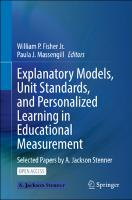Explanatory Models, Unit Standards, and Personalized Learning in Educational Measurement
Selected Papers by A. Jackson Stenner
Contributor(s)
Fisher Jr., William P. (editor)
Massengill, Paula J. (editor)
Language
EnglishAbstract
The papers by Jack Stenner included in this book document the technical details of an art and science of measurement that creates new entrepreneurial business opportunities. Jack brought theory, instruments, and data together in ways that are applicable not only in the context of a given test of reading or mathematics ability, but which more importantly catalyzed literacy and numeracy capital in new fungible expressions. Though Jack did not reflect in writing on the inferential, constructive processes in which he engaged, much can be learned by reviewing his work with his accomplishments in mind. A Foreword by Stenner's colleague and co-author on multiple works, William P. Fisher, Jr., provides key clues concerning (a) how Jack's understanding of measurement and its values aligns with social and historical studies of science and technology, and (b) how recent developments in collaborations of psychometricians and metrologists are building on and expanding Jack's accomplishments. This is an open access book.
Keywords
Psychosocial metrology; Measurement science; Psychometrics; Sociocognitive ecosystems; Rasch models; Predictive modeling; Linear logistic test models; Reading measurement; Quantification; Ecologized educationDOI
10.1007/978-981-19-3747-7ISBN
9789811937477, 9789811937477Publisher
Springer NaturePublisher website
https://www.springernature.com/gp/products/booksPublication date and place
Singapore, 2023Imprint
Springer Nature SingaporeClassification
Scientific standards, measurement etc
Education
Psychological testing and measurement
Probability and statistics


 Download
Download Web Shop
Web Shop